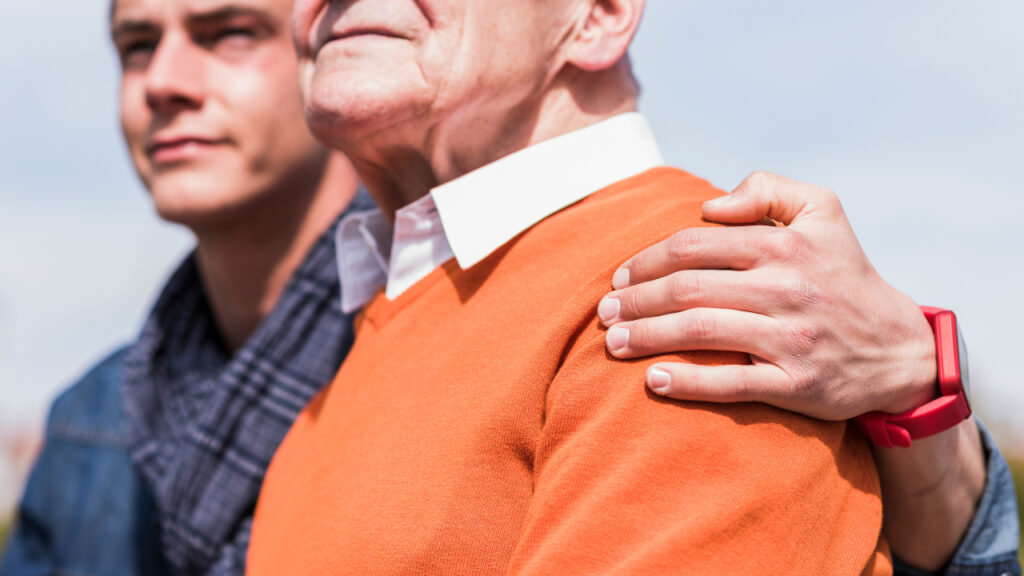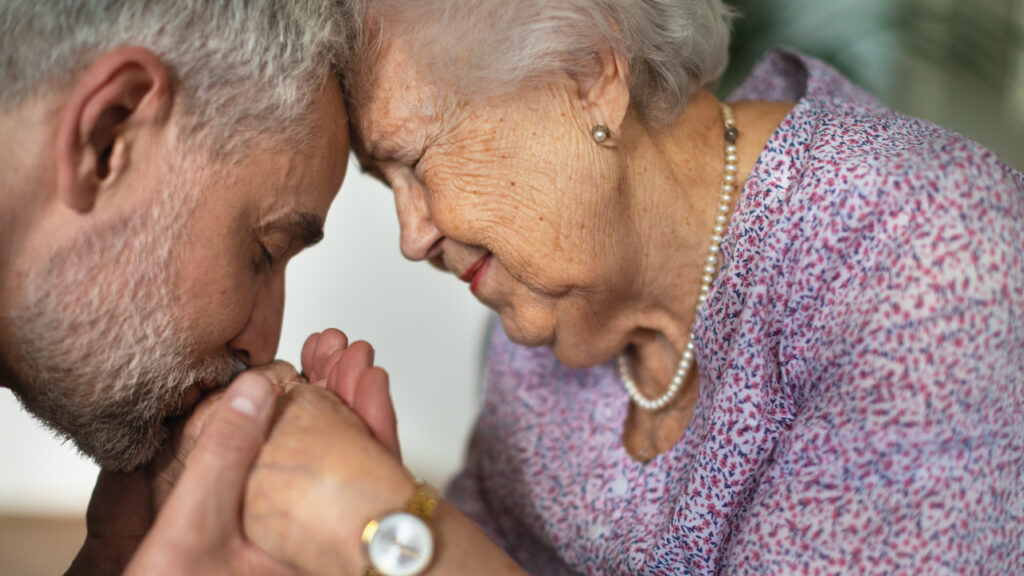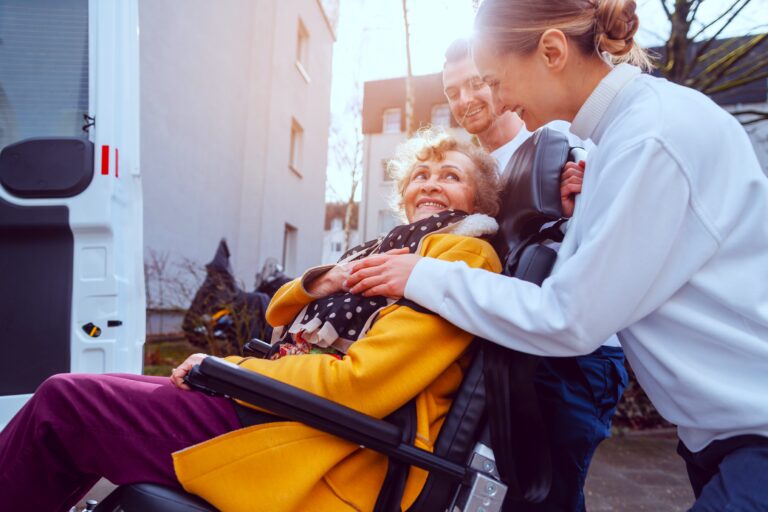Becoming quieter, losing interest in the little things or withdrawing from the people you care about? At first glance, it may seem like an “age thing”. But it’s often more than that. Depression in the elderly does exist – and you don’t always see it at first. The signs can be discreet, confusing, even silent. But the impact is real and profound.
So often mistaken for “normal” aging, it ends up being hidden. But it shouldn’t. Because suffering is real and treating depression can restore meaning, pleasure and even hope to those who thought their best days were behind them.
Key points of the article
- Depression is not a natural consequence of ageing and can go unnoticed in the elderly
- Symptoms don’t always include sadness – they can appear as physical pain, apathy or isolation
- Factors such as loneliness, chronic illness and loss of autonomy increase the risk
- Early diagnosis and appropriate treatment (medication, psychotherapy and social support) significantly improve quality of life
- Prevention involves promoting an active, healthy lifestyle with a connection to the community
- There are helplines available for those who need help or guidance.
What is depression in old age anyway?
Depression is not just a phase of sadness, nor a sign of weakness. It is a profound emotional disorder that affects the way a person thinks, feels and lives. And when it appears in old age, it can be even more difficult to recognize, both for those who feel it and for those around them.
Often, it doesn’t manifest itself with tears or sad words, but rather with prolonged silences, causeless pain, constant tiredness or an apathy that takes over every day. Instead of saying they’re sad, many elderly people just say they’re tired, in pain or that they don’t have the patience for anything anymore. This is why so many symptoms end up being mistaken for “normal” aging – and go unnoticed.
Which countries suffer most from depression?
A DREES study, based on the 2019 European Health Interview Survey (EHIS), revealed that France had, before the pandemic, the highest rate of depression in Europe, with around 11% of the population affected.
Portugal had one of the highest rates of chronic depression, according to Eurostat, with 12.2% of the population reporting symptoms, surpassed only by Slovenia. More recently, an OECD report from 2023 reinforces that Portugal is among the countries with the highest levels of anxiety and depression in the European Union.
Why does depression affect so many elderly people?
The truth is that ageing brings profound changes: the loss of friends or life partners, retirement, social isolation, the onset of chronic illnesses or the feeling that you no longer “belong” in the active world. All of this can profoundly affect mental health.
In Portugal, according to data analyzed up to 2023, studies indicate that around 15% of the elderly may have depressive symptoms. And this figure rises to 30% in institutionalized environments, such as nursing homes or hospitals.
It is also more common among older women and among elderly people with multiple health problems. But it’s not inevitable. And it must not be ignored.
Symptoms of depression in the elderly: what to look out for
The signs are not always the classic ones and there are also cases in which depression is confused with dementia, especially when there is forgetfulness, slow thinking and disorientation.
Here are some of the most common symptoms in old age:
- Social isolation and lack of interest in being with other people
- Constant fatigue or lack of energy
- Physical pain with no medical explanation
- Insomnia or oversleeping
- Significant weight loss or weight gain
- Difficulty concentrating or making decisions
- Feelings of guilt or worthlessness
- Recurring thoughts about death.

What are the main risk factors?
Depression in old age rarely has a single cause. It is often born out of the accumulation of losses, changes and silences. The body weakens, loneliness grows, life slows down. These are biological, psychological and social factors that together make the days more difficult to cope with.
In the elderly, the most common are:
- Loss of spouse or friends
- Retire and lose purpose or routine
- Living alone or with little family support
- Economic problems or difficulties in maintaining autonomy
- Chronic diseases such as diabetes, stroke or heart disease
- Prolonged use of certain medications
- Previous history of depression.
How to diagnose and treat depression in the elderly?
The good news? Yes, depression can be treated, even in the elderly.
The first step is to recognize the symptoms and seek medical help. Diagnosis is clinical, made by assessing the symptoms and sometimes with the help of validated scales for the elderly population.
Then, the treatment may include:
- Antidepressant medication, always adjusted to age and other health conditions
- Psychotherapy, namely cognitive-behavioral therapy, which has shown good results
- Regular physical activity, which helps release hormones linked to well-being
- Socialization and participation in activities, to break isolation
- Family and community intervention, essential to create a supportive and safe environment.
In more severe or resistant cases, therapies such as electroconvulsive therapy (ECT) or transcranial magnetic stimulation may be considered.
Prevention: small changes that make a difference
It is possible to prevent (or at least reduce) the risk of depression in old age. How? Through healthy habits and routines:
- Encourage regular physical exercise, even light exercise
- Maintaining a balanced diet
- Create routines that include moments of pleasure, conviviality and purpose
- Encouraging participation in cultural, recreational or volunteer activities
- Regularly monitor physical and mental health.
The most important thing? Being present. Listening. Validating feelings. And acting on warning signs.
How to help an elderly person with depression?
Helping an elderly person with depression starts with something simple but essential: being there. Often, the greatest gesture is to listen without judging, to show that you are there, even when words are lacking. But there’s more you can (and should) do.
- Take the signs seriously. Mood swings, isolation, constant physical complaints or loss of interest in activities are warnings that should not be ignored
- Encourage people to seek professional help. It’s not always easy, but it’s essential.
- Making an appointment, accompanying the elderly person and showing them that they are not alone can make all the difference
- Support treatment. Depression can be treated, but it requires follow-up.
- Helping to keep appointments, follow medication and take part in therapies is a form of active care
- Promote routines and simple activities. Inviting them for a walk, watching a movie together or even preparing a meal can bring back small moments of pleasure
- Avoid minimizing feelings.
- Phrases like “it’ll pass” or “you have to react” can increase the feeling of incomprehension. It’s better to listen and validate what the elderly person is feeling
- Encourage contact with other people. Socialization is a powerful tool.
- Encouraging socializing with friends, family or community groups can break the cycle of isolation.
Above all, it’s important to remember that depression is not a fault, it’s a disease. And like any other, it deserves attention, empathy and treatment. The sooner action is taken, the greater the chances of recovering quality of life.
And when do you need extra support?
There are times when, no matter how close family and friends are, it’s not enough. When the suffering becomes heavier, it’s important to know that there are hands outstretched, ready to listen, guide and support, in a safe and non-judgmental way.
In Portugal, there are free and confidential helplines that can be of precious help:
- SNS 24 Line – 808 24 24 24 (with psychological support included)
- SOS Voz Amiga Line – 213 544 545 / 912 802 669 / 963 524 660 (every day from 15h30 to 00h30)
- National Institute of Medical Emergency (INEM) – 112 (in emergency situations)
- National Integrated Continuing Care Network – National Health Service
- Associação Novo Cuidar – home support and personalized accompaniment.
These structures exist to support, guide and often save lives.




